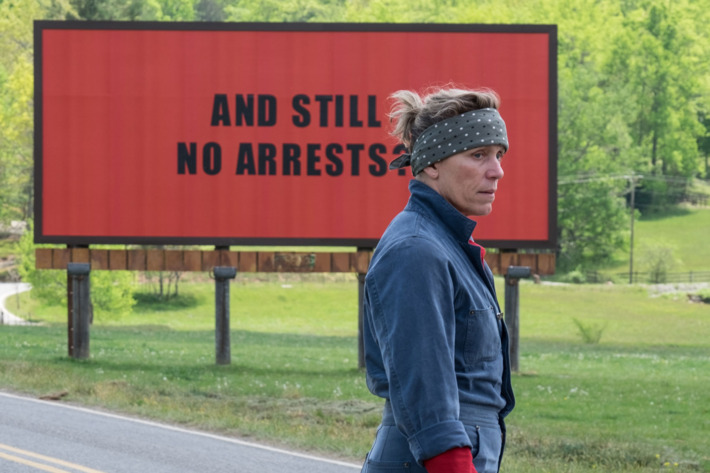

Recall in everyday life those three seconds of rage after something goes wrong before one decides on a response. Three Billboards Outside Ebbing, Missouri occupies and amplifies that crucial moment of turbulence, what comes before and after, and how people face it. Frances McDormand leads the film as Mildred, uniformed in blue coveralls and a headband, she looks like Rosie the Riveter if Rosie smoked far too many cigarettes and poured one too many whiskeys. Indeed the film’s MVP, or at least what seems to clock in the most screen time, is McDormand's wearied visage upon which the camera gives stately reverence. McDormand, never less than spectacular, makes the role look easy. Between the scowling are flashes of surprise and compassion, but these fade by way of the fast-moving script, which rests on the bravado of its expertly ricocheted dialogue. It is not fast enough to make you lose your place like the whiplash of Sorkinese, or as cheeky as Tarantino repartee. Irish writer/director Martin McDonagh’s words are more blunt and his not so secret ingredient anger. Wholly appropriate given that this is the sentiment that fuels many of the characters, first and foremost Mildred, whose daughter has been raped and murdered.
Mildred for one takes the long con, renting out the aforementioned billboards on a less-traveled dirt country road at a decent price from local (Caleb Landry, better with every role) and plasters bold text against a blazing scarlet background admonishing the local law enforcement for failure to catch her daughter's murderer and rapist. Called out by name is Chief Willoughby (Woody Harrelson, bringing his steady, if by now, tired combo of traditional masculinity and teddy-bear tenderness) which brings attention to the police's preoccupation with harassing the town’s black minority. What ensues is a quick escalation of tensions within the town. Willoughby seems a straight shooter, but his junior officers are troubling. In particular, Dixon (Sam Rockwell) a dimwitted racist mama’s boy and tidy picture of America’s worst nightmare in the era of the Trump administration. Stomach-churning.
Perhaps it takes an outsider like McDonagh to get it right, but by picture’s end, a few wrenches of plot unite the deplorable with Mildred and lend him a contrived sympathy. Three Billboards does not excuse any characters, thankfully, but neither does it delve into its deeper issues like racism, instead paring them to a minimum. There is little beyond Mildred’s initial blast in the billboards. The film does give personal histories and backstories in miniature though, which cause the film to spiral out like fireworks along with each character’s trajectory of pain. These include excellent turns by Lucas Hedges as Mildred's dutiful son, Peter Dinklage as her shy but loyal suitor, and John Hawkes, as the wife-beating ex-husband. Some of these narrative threads drop like bodies, as the film, a well-oiled machine in terms of pacing, ends abruptly before another potential bout of anger. This is as close as we get to optimism in McDonagh's world.